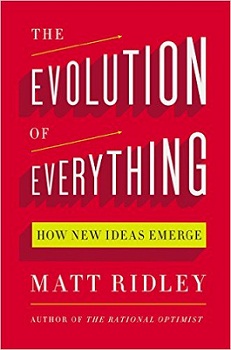
On our sister website, the Library of Law and Liberty, I have a review of Matt Ridley’s new book, “The Evolution of Everything”. Check out the comments, too. The discussion over what should or shouldn’t count as “political progress” is a very interesting one.
Should we consider the decline of “aggregate violence” as proof of the fact that modern states, on balance, “saved” more people (by pacifying nations) than killed them (by, well, killing foreign civilians, Jews, Gypsies, class enemies, and kulaks, among others)? One point and one question. First: there is no question that the modern state is a highly successful institution. It has solved some problems, this is why it still survives and, though a rather recent artifact, it appears as immutable and eternal in the eyes of most. Second: how much of the decline in “private” violence (that is: coercion by unorganised individuals over unorganised individuals) can be directly traced to the institution of governments? And, even so, should we really infer that the more you spend and regulate, the more violence declines?
Back to Ridley’s work. “The Evolution of Everything” is a rather different book than “The Rational Optimist“. “The Rational Optimist” dealt by and large with facts; “The Evolution of Everything” deals with ideas. I found it a very enjoyable, and challenging, book. Ridley conceived it as a book to counter “skyhooks,” defined as “devices for explaining the world as the outcome of design and planning.”
Central planning and over-regulation are among Ridley’s “skyhooks.”
This might recall a comment Herbert Spencer made in Social Statics: “…idolatry is a mode of thought under which all causation is attributed to entities.” The idea that all causation is attributed to entities is a powerful ally of interventionism, as it attributes to government the power of shaping and molding society and the economy.
This is why Spencer thought that the “development of politico-economical science” should be applauded as a victory of “natural philosophy over superstition.” The same is true for Ridley’s book.

READER COMMENTS
ThomasH
Jan 9 2016 at 4:02pm
Of course not. One should look at increased or decreased spending or regulation along each dimension on the margin — and decresed private violence is not the only kind of benefit. Maybe we need to spend less on airport security and more on subsidized health care, regulate taxicabs less and CO2 emissions more.
ThomasH
Jan 10 2016 at 4:48pm
Sounds moderately interesting, but since no one believes in central planning nor, by definition, in “over” regulation, who is it addressed to?
Now if the implication that Ridley wishes one to draw from his thesis is that the results of the evolution of the democratic capitalistic system down to early 2016 cannot be improved by any conceivable tax change or regulation of a market price, that is a very big thesis indeed.
Scientists who understand and even marvel at the intricacy of evolution are not averse to developing higher yielding wheat or pesticide resistant soybeans. I don’t see why economists, who have a very Hayekian appreciation of the glories of the price system, should be more modest.
No one else is.
Shane L
Jan 11 2016 at 11:22am
I was intrigued by Herbert Spencer’s quote about idolatry. I’ve read that animism and the tendency to project human characteristics onto physical phenomena may be innate in children. It has occurred to me before that the animist and often religious notion that physical phenomena like the weather are caused by, or represent, the emotions of gods or spirits is a little similar to the conspiracy theorist’s sense that a complex world is explained by the machinations of a powerful elite. Both explain complex events in terms of the intention of powerful entities.
Comments are closed.